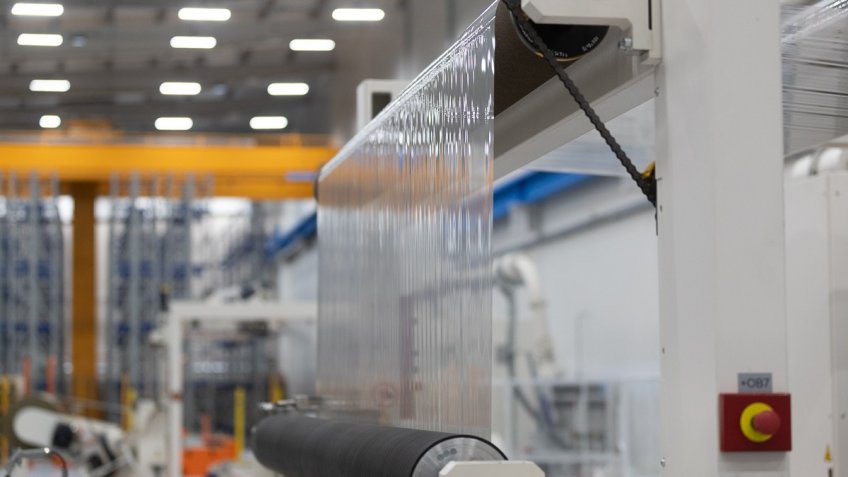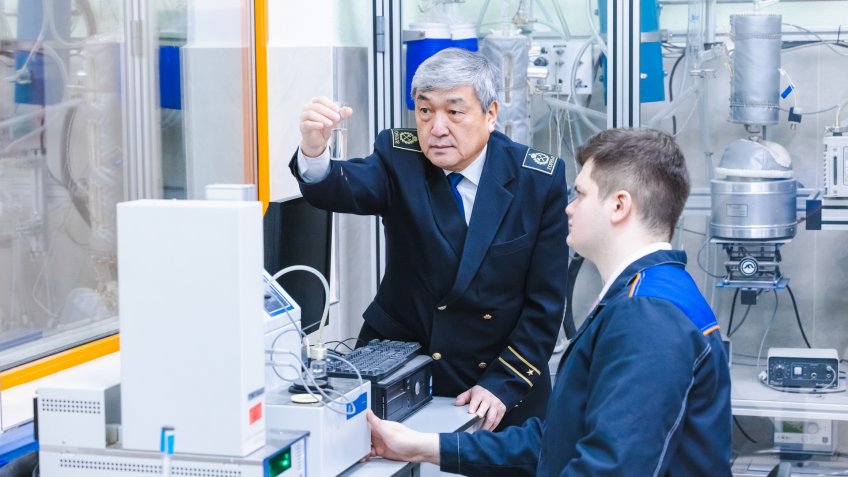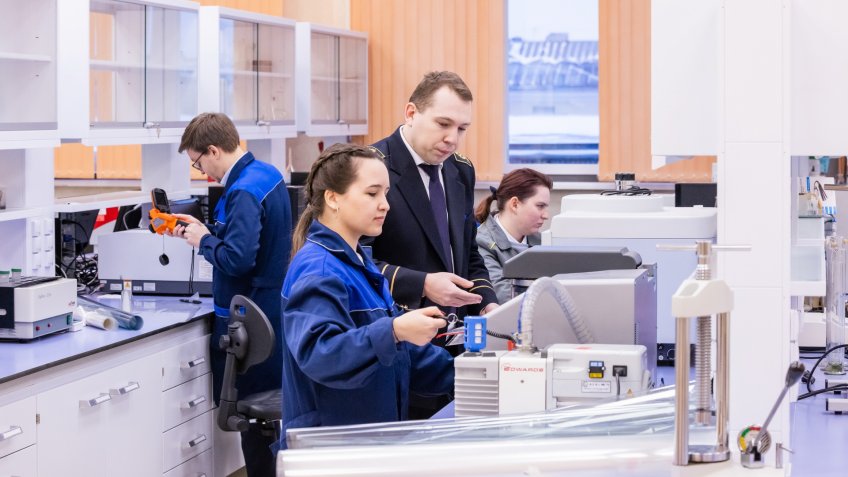
On New Year's Eve, a new high-tech enterprise, Titan-Polymer, which produces PET pellets and BOPET film, was opened in the Pskov region, on the territory of the special economic zone Moglino. The President of Russia took part in the ceremony of launching its first two production lines online. He called the event a prerequisite for the formation of "a whole industrial cluster of industries that will use just the products of this plant as raw materials." Forpost decided to find out what caused such a close attention of the head of state to the next project of the Group of companies "Titan".
Work on its implementation began back in 2019. Such a long preparatory period was necessary in order to create domestic technologies for obtaining end products capable of competing in quality with Western samples. First of all, we are talking about BOPET film, which is in demand in the food industry, construction, medicine, and agriculture. For example, as a covering material for greenhouses or packaging for perishable products.
At the initial stage the enterprise will produce up to 72 thousand tons of various modifications of such film per year, which will allow to provide 100% of the Russian consumers. Plans for the next two years include launching of workshops for production of staple fiber used in textile industry to produce yarn and nonwoven materials, cord threads, which are superior to most natural and chemical analogs in strength, as well as tire cord - the power base of car tires. The feedstock for all these high-margin products will be PET pellets, which are already produced at Titan-Polymer in the amount of up to 210 thousand tons per year.
"I want to emphasize that the state will support the creation of such productions. We need them for the dynamic development of the economy, increasing the production of our own high-quality products. We will continue to promote the development of modern, high-tech companies throughout the country, we will create the most comfortable conditions for investors," said Vladimir Putin, opening the plant.
Mikhail Sutyaginsky, Chairman of the Board of Directors of Titan Group of Companies, said that the use of BOPET film for packaging perishable food products makes it possible to extend their shelf life by almost three weeks. And for frozen foods, it can extend their shelf life to 46 months. This is possible because the developed technology makes it possible to more effectively protect them from oxygen penetration, the interaction with which makes the food unfit for consumption.
"There's another undoubted advantage. Our film has the same light permeability as glass. At the same time, it is able to reflect thermal radiation more efficiently, that is, as they say, to keep heat in. Right now scientists from St. Petersburg Mining University and I have already got intermediate results, when we save up to 20% of electricity. But we want to raise this bar to 40-60%, that is, to bring the level of energy savings up to 60%. We will produce less cold by air conditioners in summer and less heat in winter. This will allow to save significantly on electricity bills and reduce its consumption, which is the most important state task," noted Mikhail Sutyaginsky.
Research in the field of deep processing of raw materials in St. Petersburg Mining University, which traditionally provides scientific support for all projects of Titan Group, as well as many other flagships of the national industry, is given increased attention. Vladimir Litvinenko, the rector of the university, believes that one of the prerequisites for maintaining our sovereignty is to create as many value-added chains as possible inside the country. In other words, enterprises that are able to provide the entire production cycle, from raw material extraction to the production of final products.
For example, in order to make BOPET film, six processing steps are required. After primary processing, which consists of extracting light hydrocarbons from oil or natural gas, the stages of obtaining olefins, polymers and polypropylene follow. Then the latter is used to make PET pellets, and then - consumer goods - plastic bottles, film, fibers, threads, components for electrical engineering and much more. The final link in the various technological cycles based on fossil fuels can be almost any product. Furniture, pipes, medicines, varnishes, paints, car tires, clothing, and so on.
"There are many directions of development of science for specific tasks of the economy. One of them is the creation of oil and gas chemical clusters engaged in deep processing of minerals. We need to learn to perceive natural capital not as a raw material that brings export revenues, but as an element of high technology - the first link in the chain of creating high-margin products of high redistribution. This strategy will allow for a sharp increase in the number of jobs in the country in a relatively short period of time. For example, launching of Titan-Polymer plant provided employment for 270 people, almost all of them locals. But this is a local task; on a global scale, we are stimulating domestic demand, ensuring growth of the population's well-being, increasing tax revenues to the budget and laying the foundation for a significant growth of Russia's GDP," Vladimir Litvinenko assures.
He believes that the minimum amount of natural resources that must be involved in deep processing should be defined at the legislative level, and their sale abroad should be reduced. The government in this system of coordinates is obliged as a state regulator to determine which resources and from which specific field will go to which enterprise, as well as to coordinate the integration processes within each value chain. The function of employer must remain with private companies
"When processing hydrocarbon raw materials into polypropylene products the surplus value of the final product increases 10-12 times compared to the price of crude oil. So this is a much more profitable business, but it, of course, requires significant financial investments, serious scientific support and availability of competent personnel. Businessmen are far from always willing to take risks and prefer to make a profit the way they know how. Therefore, we cannot do without government participation as a regulator of creation of such value chains. It is the government that must initiate the process of systematic implementation of profile projects and manage them. In particular, to create conditions for investment in the industry, to intensify the process of generation of new scientific knowledge, as well as their implementation in production. In other words, to set specific tasks for scientists and business and to mobilize society to solve them," Vladimir Litvinenko emphasized.
The research needed to develop import-substituting technologies for producing new special grades of PET films and PET pellets with increased barrier properties and resistance to ultraviolet radiation has been going on at St. Petersburg Mining University for several years. In particular, the scientists of the university conducted a great number of scientific experiments aimed at selecting the optimal raw materials for producing BOPET films and increasing their energy efficiency.
"The results of the research showed that BOPET films are a high-quality base for creating a material that blocks up to 50% of the radiant component of heat transfer. Further experiments on promoting the base with special additives will allow us in the near future to create effective spectral-selective coatings capable of reflecting thermal radiation and thus increasing the energy efficiency of buildings and structures by at least 20%. This result can be achieved by gluing films on glasses that will reflect thermal radiation, leaving it in the room, without losing light permeability," said Igor Pyagay, head of the scientific center "Problems of mineral and technogenic resources processing" at the Mining University.
Vyacheslav Rudko, Executive Director of the Center, specified that at the moment scientists of the St. Petersburg university are working on such projects as creation of unique technology of needle coke production, synthesis of highly effective additives and fuel additives, recycling of man-made resources, in particular red and saponite sludge. The results of these studies will be implemented at the sites of St. Petersburg university's partners - Rosneft, SIBUR, PhosAgro, Novatek and others.





